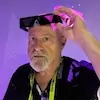
Welcome back to our weekly roundup of happenings from XR and AI realms. Let’s dive in…
The Lede
Apple has paused development of its cheaper Vision Pro successor. Code-named N100, the Apple AI smart glasses are aimed squarely at the market Meta is creating. Bloomberg’s Mark German reports the planned 2027 Vision Pro headset revamp has been deprioritized, with staff reassigned to accelerate work on glasses seen as a bigger growth market. Apple seems to have realized what everyone else knew years ago: audio smartglasses are for the masses, fully occluded headsets are niche. Samsung is going to find out this fall that their new MR headset, “Moohan,” is similarly fighting the last war. Samsung does have AI audio smart glasses on the way, too, a collaboration between Qualcomm and Google. As with AI, Apple is playing catch up here, but they did the same with the first iPod, and it could easily happen again. However, David Heaney of Upload VR, reported in a counter story that test results for a new Apple Vision Pro headset are now listed on the FCC’s official website.
Feeling Spatial
Moonlake AI, a San Francisco startup, has launched with $28 million in seed funding from AIX Ventures, Threshold, Nvidia Ventures, and notable tech investors like Steve Chen and Naval Ravikant. The company’s platform promises to let anyone build interactive 2D and 3D game worlds in minutes using natural language prompts, with models handling layout, physics, agent behavior, and real-time editing. Moonlake is currently in private preview with early access applications open. Moonlake was founded by Fan-Yun Sun and Sharon Lee, both working out of Stanford AI Lab.
Meta’s internal studio Ouro Interactive has released Super Strike, a shooter on Horizon Worlds available only on mobile. While the game itself is conventional team-vs-team or free-for-all action, the bigger signal is that Meta is prioritizing mobile access over VR for its metaverse platform. At Connect, Meta launched a $2.5 million contest for Horizon Worlds mobile games, further cementing this pivot. The company continues to invest in MR/VR content and is rumored to have a new headset next year, but this confirms our observation that Meta Horizon is hoping to create a credible Roblox competitor to jumpstart its idea of the Metaverse.
The AI Desk
OpenAI has unveiled Sora 2, its next-gen video+audio AI model, and launched it via a TikTok-style social app. This follows Meta’s new GenAI social network, Vibe. Sora 2 supports synchronized dialogue, ambient sound, and physically realistic motion, allowing users to insert “cameos” of themselves. OpenAI claims earlier video models would distort reality to fulfill prompts; Sora 2 is designed to better adhere to real-world dynamics. At launch, the app is invite-only, free in the U.S. & Canada, with limits to usage tied to compute availability.
Thinking Machines Lab, founded by ex-OpenAI researchers including Mira Murati, has launched Tinker, its first product. The tool automates the fine-tuning of frontier open-source models (Meta’s Llama, Alibaba’s Qwen) via supervised and reinforcement learning. Tinker abstracts away much of the infrastructure complexity while giving users control of data and training loops. The company is not charging yet during API early access. It views this as a way to democratize advanced model customization and enable a wider range of actors to experiment with state-of-the-art AI.
Spatial Audio
For more spatial commentary & insights, check out the AI/XR Podcast, hosted by the author of this column, Charlie Fink, and Ted Schilowitz, former studio executive and futurist for Paramount and Fox, and Rony Abovitz, founder of Magic Leap. This week’s guest is XR’s leading blogger, developer Tony “Skarred Ghost” Vitillo. You can find it on podcasting platforms Spotify, iTunes, and YouTube.
 Charlie Fink is an author and futurist focused on spatial computing. See his books here. Spatial Beats contains insights and inputs from Fink’s collaborators, including Paramount Pictures futurist Ted Shilowitz.
Charlie Fink is an author and futurist focused on spatial computing. See his books here. Spatial Beats contains insights and inputs from Fink’s collaborators, including Paramount Pictures futurist Ted Shilowitz.
